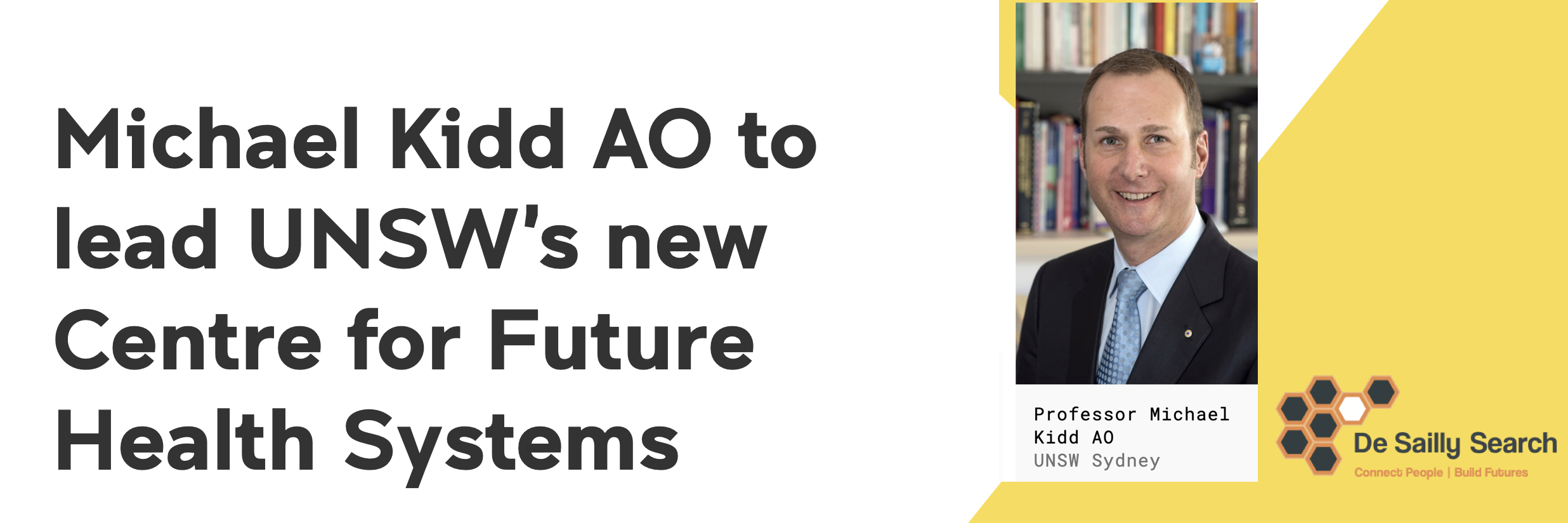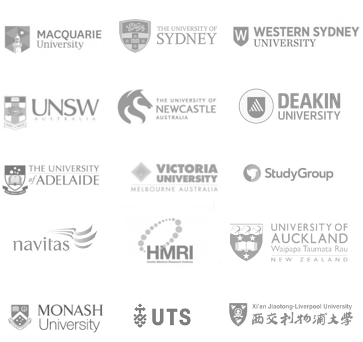
Profess or Michael Kidd AO has been appointed as the inaugural Director of the new UNSW Centre for Future Health Systems, following more than three years as Australia’s Deputy Chief Medical Officer. As part of the role, and through a partnership with The University of Oxford, he will also be appointed as Professor of Global Primary Care and Future Health Systems at that University. Before returning to Australia at the start of the COVID-19 pandemic, Professor Kidd was based in Canada where he was the Director of the World Health Organization Collaborating Centre on Family Medicine and Primary Care, Chair of the Department of Family and Community Medicine at the University of Toronto, and Senior Innovation Fellow with Canada’s Institute for Health System Solutions and Virtual Care.
or Michael Kidd AO has been appointed as the inaugural Director of the new UNSW Centre for Future Health Systems, following more than three years as Australia’s Deputy Chief Medical Officer. As part of the role, and through a partnership with The University of Oxford, he will also be appointed as Professor of Global Primary Care and Future Health Systems at that University. Before returning to Australia at the start of the COVID-19 pandemic, Professor Kidd was based in Canada where he was the Director of the World Health Organization Collaborating Centre on Family Medicine and Primary Care, Chair of the Department of Family and Community Medicine at the University of Toronto, and Senior Innovation Fellow with Canada’s Institute for Health System Solutions and Virtual Care.
Driving excellence in future health systems through research, education and advocacy
About the Centre for Future Health Systems
The Centre for Future Heath Systems is a newly established initiative with support from The Ian Potter Foundation, and will leverage existing expertise and build new capacity to further UNSW’s multidisciplinary health systems research and improve health policy and advocacy. The centre will partner with consumers, Primary Health Networks, Local Health Districts, healthcare providers, Government, Universities and industry, to develop, test and implement solutions which address critical issues for the Australian health system.
 The Centre sits within UNSW Medicine, one of the world’s top 50 medical faculties, and the national leader for research impact. In addition, UNSW has the oldest and largest health management program in Australia, and the education offerings have been scaled up to address health system challenges such as value-based health care.
The Centre sits within UNSW Medicine, one of the world’s top 50 medical faculties, and the national leader for research impact. In addition, UNSW has the oldest and largest health management program in Australia, and the education offerings have been scaled up to address health system challenges such as value-based health care.
The Centre will be located in the UNSW Health Translation Hub based in the Randwick Health & Innovation Precinct, and will focus on equitable access to affordable, quality healthcare for all Australians. Investment in the Randwick and a number of other precincts is underway, with $1bn committed investment by UNSW until 2030 and a network of collaborative partnerships with government, industry and academia. The UNSW Health Precincts aim is to deliver initiatives of significant societal impact through developing collaborative spaces to drive development in healthcare, innovation, education and research.
As a new flagship research centre, the centre will build on the University’s demonstrated track record in health systems research that brings together a number of areas where UNSW researchers and university partners are already doing leading work, including:
- UNSW School of Population Health
- UNSW Centre for Big Data in Health Research
- UNSW Centre for Primary Healthcare and Equity
- The Kirby Institute at UNSW
- The George Institute for Global Health

- National Drug and Alcohol Research Centre at UNSW
- Black Dog Institute affiliated with UNSW
- Health Economics and Health Systems Research Group
- UNSW Ageing Futures Institute
- ARC Centre of Excellence for Population Health Ageing, UNSW Business School (CEPAR)
- Health@Business Research Network, UNSW Business School
- Centre for Social Research in Health
- Tyree Foundation Institute of Health Engineering (iHealthE)
Context

- increased healthcare needs and costs
- increasing burden of chronic, co-morbid diseases
- advances in in medical and information technologies
- focus on preventative and population health
- access and socio-economic disadvantages, particularly for Indigenous Australians
About the opportunity
The Director of the Centre is responsible for developing and achieving the Centre’s academic and operational vision, through fostering excellence and impact in research, teaching, and engagement. They will work closely with academics from a range of discipline working in health systems and services research, and also build relationships with partners and stakeholders externally to develop the Centre’s portfolio and assist in exporting the research agenda into performance of the national healthcare system.
The Director has leadership experience in research and evidence-based decisions involving industry and government as well as authority and standing with stakeholders in Australian health systems policy and resources.
Join a University committed to social impact

UNSW recently launched the Gateway Equity program, to enable more students from educationally under-represented schools, diverse and low-socioeconomics status (low-SES) backgrounds to access a university education. The program is part of the University’s 2025 Strategy focused on increasing social impact.
For other opportunities see our postings here.


